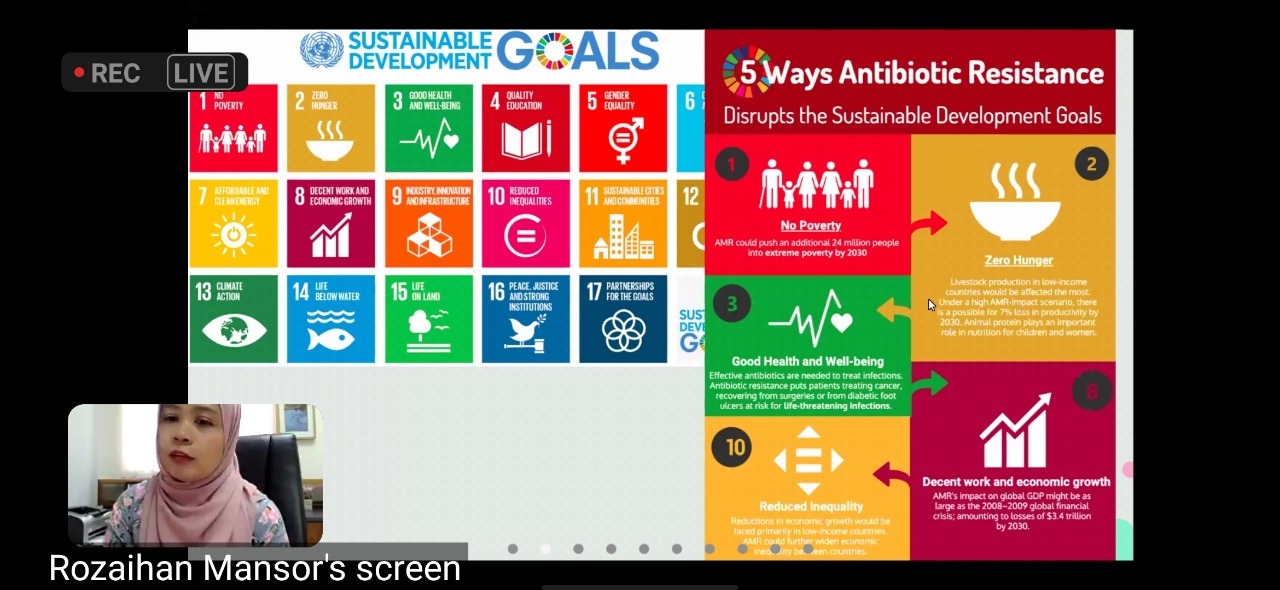UNAIR NEWS – Last weekend, the Veterinary Public Health Division of the Faculty of Veterinary Medicine (FKH) UNAIR held a “Decota Guest Lecture” program. The Decota program is a breakthrough by inviting lecturers from partner universities abroad to give lectures or webinars online to Unair students.
On the first day, the Veterinary Public Health Division invited Dr. Rozaihan Mansor from the Faculty of Veterinary Medicine University Putra Malaysia, who presented a material entitled “Antimicrobial Usage and Resistance in Dairy Cattle.”
At the beginning of the presentation, Dr. Rozaihan said that the tagline Antimicrobial Resistance (AMR) is a global tagline intensely campaigned in recent years. The Sustainable Development Goals (SDGs) clearly state antimicrobial resistance as a program that deserves attention for its continuation in the future.
The World Health Organization (WHO) also includes AMR in the top 10 global public health threats. AMR is currently predicted to cause 700 thousand deaths and will keep increasing up to 10 million deaths globally in 2050 if not treated seriously.
“AMR is a complex public health issue that requires the involvement of multiple stakeholders across sectors and levels of organization and governance,” said Dr. Rozaihan.
Furthermore, this issue is exacerbated by the inappropriate use of antimicrobial drugs in health; animal; food; agriculture and aquaculture; lack of access to health services; and antimicrobial residues in soil, plants, and water.
Dr. Rozaihan said AMR is a condition where viruses or bacteria cannot be killed with antimicrobials (anti-virus, -ed) or antibiotic drugs. It threatens the ability of the body of both animals and humans against infectious diseases that can cause disabilities or even death.
In the case of AMR in livestock, it becomes dangerous for humans because eradicating viruses or resistant bacteria in the livestock using drugs will be difficult. As a result, continued Dr. Rozaihan, viruses or bacteria can be transmitted to the human body if humans consume the livestock with the resistant viruses.
“Some of the causes are excessive use of antimicrobials, use of antimicrobials without indications or under recommended doses, and transmission of resistant bacteria in health facilities that lack of vigilance,” explained Dr. Rozaihan.
Every country, she said, must be highly committed to preventing antimicrobial resistance since if it is not handled seriously, this pandemic can cause a very dangerous humanitarian disaster.
“The use of antimicrobials to prevent disease and promote growth in healthy livestock should be avoided,” explained Dr. Rozaihan.
Doctor Rozaihan added that farmers also need to apply good livestock practices and infection prevention and control. Hopefully, they can produce livestock products that are healthy, disease-free, and free of antibiotic residues.
The Government of Indonesia has issued several regulations to prevent the occurrence of antimicrobial resistance. For example, Law 18 of 2009 concerning Livestock and Animal Health Article 51 Paragraph (3) states that everyone is prohibited from using certain veterinary drugs on livestock whose products are for human consumption.
Furthermore, Article 4 of the Minister of Agriculture Regulation 14 of 2017 states that veterinary drugs that can endanger human health are prohibited from being used on livestock and their products for human consumption.
Author: Muhammad Suryadiningrat
Editor: Nuri Hermawan (YA/AP)





